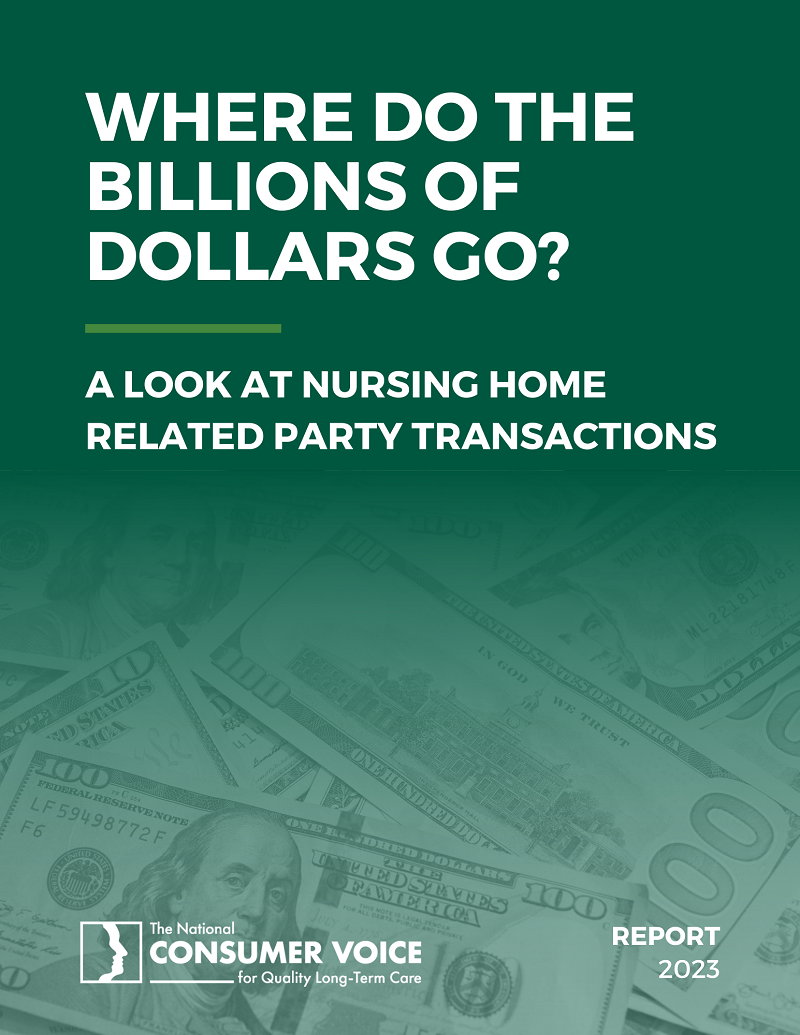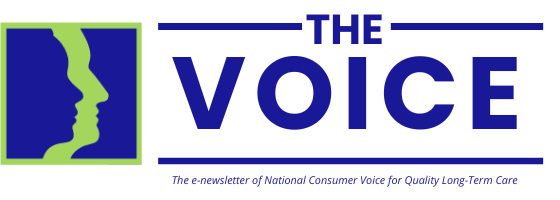|
January 2, 2024
In this Issue:
- Call for Session Proposals for the 2024 Consumer Voice Conference
- Politico Highlights How Private Equity Lenders Put Nursing Home Residents at Risk
- Washington Post Investigates Assisted Living Residents Wandering Away from Facilities
- Report Highlight: Where Do the Billions of Dollars Go? A Look at Nursing Home Related Party Transactions
|
|
Call for Session Proposals for the 2024 Consumer Voice Conference
Join us for the 2024 Consumer Voice Conference at Hotel Nikko in San Francisco, California, September 23-26, 2024. Consumer Voice's Annual Conference educates and empowers long-term care consumers and consumer advocates.
We are seeking proposals for conference sessions that create an engaging, informative conference agenda that provides resources, tools, opportunities for discussion, and strategies our attendees can incorporate in their life and/or advocacy.
Two easy steps to submit a proposal:
- Review the Call for Proposals and Presenter Requirements.
- Submit your proposal via Survey Monkey. NOTE: You will not be able to save incomplete submissions in SurveyMonkey, so you may want to review and print or save the PDF version of the proposal questions so you can plan your responses prior to starting the submission.
Proposals are due by March 1, 2024.
|
|
Politico Highlights How Private Equity Lenders Put Nursing Home Residents at Risk
A special report from Politico highlights how nursing home operators mismanage finances at the expense of residents. In 2018, Atrium Health and Senior Living in Weston, WI abruptly closed, suddenly uprooting and traumatizing residents. Atrium's owners were indicted for Medicare and Medicaid fraud, allegedly paying themselves more than $37 million from 2015-2018. Atrium had borrowed money from MidCap Financial, an affiliate of private equity firm Apollo Global Management, to expand its nursing home empire, which allowed owners to take money out of their business, even while bills went unpaid. According to the Politico article, "The relationship between lender and nursing home operator is symbiotic, with each feasting off of the steady stream of fees from Medicare, Medicaid and private insurers. That has left vulnerable residents...at risk of being displaced when the empires crumble." According to the federal indictment against the company, employees at the Weston facility struggled to pay for food and medical supplies while the CEO took a salary of $1 million a year. As care at the facility deteriorated, the company MidCap also profited, charging Atrium hundreds and thousands of dollars in fees to extend its loan.
This case highlighted by Politico provides an example of how private equity firms are able to profit while residents suffer. Private equity nursing home owners are concerned with profit. They use complicated, but legal, economic practices to divert Medicare and Medicaid dollars away from residents' care and into their own pockets.
In November 2023, the Centers for Medicare & Medicaid Services published a rule implementing increased ownership and managerial disclosure requirements in nursing homes.
Consumer Voice Policy Director Sam Brooks was interviewed for the Politico article. He called for greater accountability for nursing home operators and their financial backers and emphasized the impact these practices have on residents.
Read the full article.
|
|
Washington Post Investigates Assisted Living Residents Wandering Away from Facilities
According to an investigation from the Washington Post, more than 2,000 people have wandered away from assisted-living and dementia-care units or been left unattended outside, since 2018, and nearly 100 people died. The Post examined inspection results, incident reports and media accounts from across the country. Their investigation found that state inspectors repeatedly identified failures by administrators and direct caregivers. "In case after case examined by The Post, inspectors cited evidence of too few people on duty to care for the number of residents, of staff ignoring alarms, of skipped bed checks and staff sleeping on the job, of general neglect and, in a few cases, falsified records."
For family members of injured or deceased residents, it can be difficult and confusing to investigate safety records of facilities - only 29 states make inspection and violation reports available online and some states require filing a public records request in order to obtain them. Some families were told untrue accounts by the facility of how their family member passed.
The Post's investigation tells several harrowing accounts of assisted living residents wandering away from their facilities, and their grieving family members' attempts to hold facilities accountable.
The 30,000 assisted living facilities across the country are regulated by individual states, not the federal government, and few facilities have adopted strong staffing and training requirements. The Post's report reiterated the lack of federal oversight of assisted living facilities and lack of reporting. Meanwhile, state oversight of assisted living remains insufficient. "To determine the frequency and consequences of elderly residents walking away from assisted-living facilities in America, The Post searched local media reports and filed public records requests with regulators in all 50 states and the District of Columbia. The bulk of the official records came from 29 states that make current reports public online. Two additional states said they had no incidents; 10 did not provide records nor do they make them available online; some provided only partial records. As a result, The Post’s accounting is incomplete for about 40 percent of the assisted-living population. In some states, such as Florida, records don’t always indicate whether a person died." While the Post's report shines light on the gruesome reality of the issue, the depth and breadth can't be fully known without further oversight and reporting.
In the article, Catherine Hawes, professor emeritus at Texas A&M University and former Consumer Voice Board Member, sums it up: "Assisted living is the rock we don’t want to look under."
Read the full article in the Washington Post.
|
|
Report Highlight: Where Do the Billions of Dollars Go? A Look at Nursing Home Related Party Transactions
 Each year nursing homes funnel billions of dollars through related party companies (companies they own) with little to no oversight by the Centers for Medicare & Medicaid Services (CMS). The report, Where Do the Billions of Dollars Go?: A Look at Nursing Home Related Party Transactions, provides a detailed look at related parties and how nursing homes potentially use them to hide how much money they are making and to give the illusion that their facilities are not profitable. The report uses cost data submitted to the federal government by nursing homes to illustrate the industry-wide practice of related party transactions and how at the same time, residents face inadequate staffing and poor care. Each year nursing homes funnel billions of dollars through related party companies (companies they own) with little to no oversight by the Centers for Medicare & Medicaid Services (CMS). The report, Where Do the Billions of Dollars Go?: A Look at Nursing Home Related Party Transactions, provides a detailed look at related parties and how nursing homes potentially use them to hide how much money they are making and to give the illusion that their facilities are not profitable. The report uses cost data submitted to the federal government by nursing homes to illustrate the industry-wide practice of related party transactions and how at the same time, residents face inadequate staffing and poor care.
|

|
